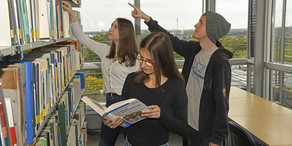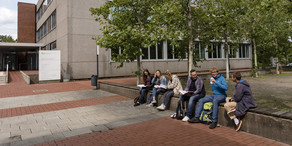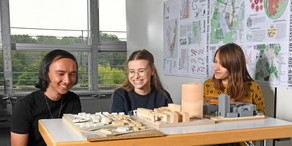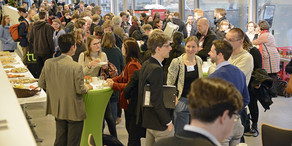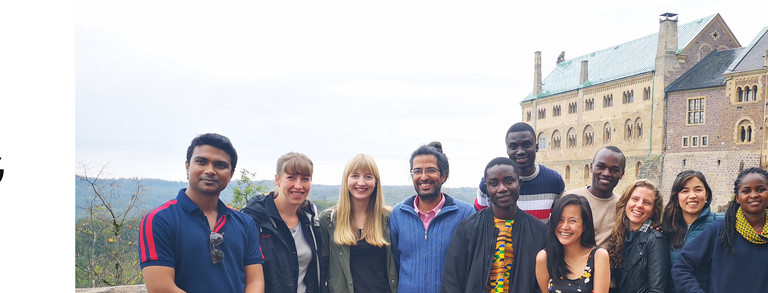Carlo Schmid Scholarship Beneficiaries
The Carlo Schmid Program (CSP), launched in 2001, promotes internships at international organizations, EU institutions and selected NGOs. It introduces highly qualified students and graduates to working methods in the international administration sector and thus improves their chances of later employment there. Training seminars accompany the internship. The program is run by the German Academic Exchange Service (DAAD) in cooperation with the Studienstiftung and the Mercator Foundation.
For outstanding DAAD-EPOS scholarship holders DAAD offers a limited number of CSP - scholarships every year. Please find below interesting reports from SPRING Alumni about their experience at international organizations.
![[Translate to English:] SPRING Alumni [Translate to English:] Photo of Katherine Coronado Mejia](/storages/raumplanung/r/SPRING/Pictures/Carlo-Schmid-Programme/SPRING_Katherine-Coronado-Mejia_Foto_hp.jpg)
In which project have you worked and what were your responsibilities?
I did my internship at the World Food Programme, in Bolivia, supporting the Monitoring and Evaluation Unit. I was in charge of supporting the monitoring of ongoing projects, the design of the annual monitoring plan and the elaboration of the annual reports of the projects. Currently, we are working with the Ministry of Planning on the update of the map of food vulnerability in Bolivia.
Which skills/knowledge obtained from SPRING were you able to apply and how were they beneficial for your daily tasks at the host organisation?
The knowledge that I gathered during the SPRING program, especially related to the formulation and monitoring of projects, the GIS mapping and the spatial planning, have been very important tools for my work in the organization. Especially for our current task to formulate the new country strategic plan for the WFP Country Office.
In which sense was the internship supportive for your professional career?
Given this opportunity by the Carlo Schmid Programme, the DAAD, the World Food Programme and the SPRING Programme, has been an enriching experience for my professional life and it has been an opportunity to return to the field of work that I really like: the humanitarian aid and development.
![[Translate to English:] SPRING Alumni [Translate to English:] Photo of Japeth Habinshuti](/storages/raumplanung/r/SPRING/Pictures/Alumni/SPRING_Japeth-Habinshuti_hp.jpg)
In which project have you worked and what were your responsibilities?
My internship essentially consisted of coordinating, planning and programming as well as regular following-up activities of the UNESCO sciences sector, which had no program specialist. For instance, I supported the UNESCO “Man and the Biosphere”-(MAB) program in DRC, assisted the Congolese Government to elaborate the national policy on scientific research and technological development, drafted concept notes on sector related issues, analyzed funding request from partners and represented the office in meetings and workshops.
Which skills/knowledge obtained from SPRING were you able to apply and how were they beneficial for your daily tasks at the host organisation?
All skills imparted by SPRING were useful, however the most useful skills are those I learnt from the planning practice module, particularly the PPPM class. Besides, the skills of module IECO 346 on regional planning and environmental management that I gained from SPRING UACh was very beneficial too.
In which sense was the internship supportive for your professional career?
At large, the internship was an occasion to familiarize myself with the UN system working environment. I gained an in-depth understanding of the UNESCO science sector, my planning skills were enhanced and I learnt how to deal with various actors in the development field. Besides, the day-to-day experience during the course of my internship has evoked a strong sense of determination and responsibility in me. This has led to the improvement of my analytical as well as learning capacity on top of better communication skills. More importantly, the internship has undeniably increased my interest in pursuing a career in multilateral organizations.
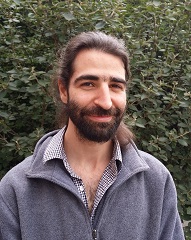
In which project have you worked and what were your responsibilities?
I joined two different projects of the World Food Programme (WFP) in Bolivia, specifically in monitoring and evaluation of projects and planning. First I worked in the school meal program which supports municipalities enhancing their school meals and improving child nutrition in vulnerable communities. In my second assignment I was involved in a humanitarian emergency measure just after the rainy season. Here I had to analysis and evaluate food security issues of rural communities which suffer from natural disasters like floods.
Which skills/knowledge obtained from SPRING were you able to apply and how were the beneficial for your daily task at the host organisation?
Apart from the academic and technical proficiencies I gained at SPRING, the knowledge about human and intercultural approaches of SPRING was really important for me. It helped me to build up a relationship between our organisation and our target groups: the rural communities. At SPRING Dortmund I could jointly study and interact with colleagues from ten different nations and my second year at the Kwame Nkrumah University of Science and Technology in Kumasi, Ghana, helped me to strengthen this cultural sensitivity further. But I also acquired important technical skills at SPRING, like how to identify and deal with development related problems as well as project design and project management.
In which sense was the internship supportive for your professional career?
After finishing my internship WFP offered me an extension of my contract for nine more months. So I could deepen my day-to-day tasks and learning experience with the organisation and the local staff. The internship plus prolongation supported me as well in the shift in my career. Because it was already my intension when I starts at SPRING to become more engaged in international development cooperation and humanitarian aid.

In which project have you worked and what were your responsibilities?
My primary interest and personal advocacy on education as a main driver of creating solutions to the multitude of societal issues was my main motivation for applying for an internship position at the United Nations Framework Convention on Climate Change (UNFCCC). The application procedure initiated from April to June 2015 while I was completing the second year of my masters degree in July 2015. I was awarded with a DAAD Carlo Schmid Programme Scholarship from October 2015 to March 2016. The internship gave me an in-depth understanding on how the UNFCCC implements its mandate and on how the Doha work program can be an effective strategy to support the achievement of a new global climate regime.
The internship placement aimed to support the Action for Climate Empowerment unit (ACE) and the UNFCCC secretariat on the implementation of the Doha work program on Article 6 of the Convention. During my internship I assisted and supported Action for Climate Empowerment activities at Conference of Parties 21/CMP 11 in Paris, France (Young and Future Generations Day and Education Day and its concurrent activities). I was involved as well in other SB 44 events such as the 4th Dialogue on Action for Climate Empowerment and the Workshop to support the intermediate review of the Doha work program on Article 6 of the Convention.
As part of the ACE unit, I was tasked to prepare two main reports of Article 6, and Newsroom articles in English and Spanish as part of the Communications and Outreach Programme of the UNFCCC, and support other administrative functions of the Unit and the Secretariat.
Which skills/knowledge obtained from SPRING were you able to apply and how were they beneficial for your daily tasks at the host organisation?
Having an intensive training on multi-cultural collaboration, SPRING has geared me with an appropriate skill set that was very beneficial during my internship. The vision and the focus of the SPRING Programme allowed me to get a dynamic view on various development issues, which are relevant themes of various UN Organizations such as the UN Climate Change Secretariat. The overall understanding of development issues, which was a huge part of the SPRING Programme, gave me a strategic advantage to understand general concepts and engaged topics during my internship. This has allowed me to create an individual standpoint in order to further my experience upon completion of my internship. Climate change and environmental issues are highly relevant topics on the development sector. Moreover, beyond the knowledge on the said topics, the multi-cultural setting that the SPRING Programme has provided gave me a competitive advantage on working on an international work environment.
In which sense was the internship supportive for your professional career?
As an architect and development planner specialized in sustainability and disaster resilience, the internship has allowed me to embrace a deeper understanding of development, promote shared values of cultural diversity, respect, professional integrity, and competence to work. These among many things are some of my most valued lessons that I gained from this experience and I aim to apply these lessons towards my continuous professional growth.

In which project have you worked and what were your responsibilities?
- Contributed to the preparation of the report “Cities and Climate Change: An Urgent Agenda” for the Bank Group clients.
- Conducted research on solid waste management in cities around the world, as an input to the update of the “What a Waste” report, which is used by policy makers and researchers.
- Contributed to the preparation of the “Urban Risk Assessment Tool”, launched at the Fifth World Urban Forum in Rio de Janeiro (Brazil), March 2010.
- Co-authored the article “Cities and Greenhouse Gas Emissions: Moving Forward”, published in Environment and Urbanization, Volume. 23, No. 1 April 2011. International Institute for Environment and Development, UK.
- Contributed to the updating of the Urban Environment and Climate Change Thematic Group website.
Which skills/knowledge obtained from SPRING were you able to apply and how were they beneficial for your daily tasks at the host organization?
The main skill I acquired from SPRING that I have applied since then was to be able to work effectively with people from various nationalities and in different environments. This is a very key asset for a professional when working in international development.
In which sense was the internship supportive for your professional career?
Having had the opportunity to be a scholar of the DAAD/Carlo-Schmid Program for an internship at the World Bank allowed me to broaden my professional career. Since 2010, when I finalized my internship, up to date I have been working with the World Bank as a development practitioner in Latin America and Africa. This was possible thanks to the Program; to which I will always be very grateful.
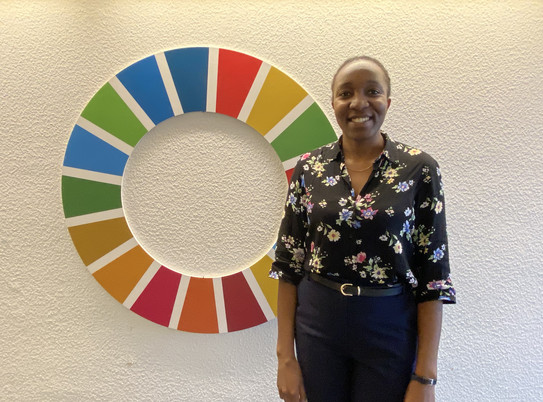
In which project have you worked and what were your responsibilities?
I work at United Nations System Staff College, the Knowledge Centre for Sustainable Development in Bonn. I support the Governance and Partnerships Portfolio in the design, development, and positioning of courses, learning, and knowledge management products around the 2030 Agenda and sustainable development. Additionally, I contribute to research on case studies, stories, best practices, and lessons learned for dissemination, replication, and upscaling of sustainable development initiatives.
Some of the projects I have worked on include:
· Anti-corruption for Sustainable Development, a 4-week online moderated course
· Social Protection for Sustainable Development, a 6-week online moderated course
· Partnerships, Financing, and Resource Mobilization, a face-to-face course
· Pilot course on Sustainable Lifestyles
Which skills/knowledge obtained from SPRING were you able to apply and how were they beneficial for your daily tasks at the host organisation?
The SPRING program has been of great benefit to my work. It offered me an interdisciplinary perspective on the environmental, social, economic, and governance aspects which are fundamental to sustainable development. This knowledge has enabled me to contribute to developing content in areas I have not specialized. Some of the skills acquired in the program that I apply in my work include stakeholder mapping, research, effective presentation, as well as other technical skills to enhance the visualization and interactivity of knowledge products.
In which sense was the internship beneficial for your professional career?
I count this internship as a stepping stone into my envisioned career in the international sphere. It is helping me sharpen my interpersonal and intercultural skills, as well as network and engage with people who share their invaluable knowledge on working in an international environment. Working in a knowledge centre also enables me to dig deeper into various topics, and this broadens my expertise in these areas.







